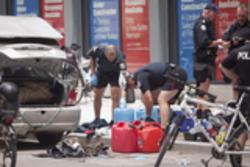Most core G20 accused to get charges dropped
The Crown is expected to withdraw charges Tuesday against most of the 17 people it accused of orchestrating the turmoil in the streets during last year's G20 summit in Toronto, CBC News has learned.
It is anticipated that 11 of the accused will get their charges of conspiracy to commit mischief, to obstruct police and to assault police withdrawn.
In exchange, sources close to the deal said, four defendants will plead guilty to counselling mischief and two to counselling mischief and counselling to obstruct police, with the prosecution and defence agreeing on sentence recommendations of six months for some to 20 months for others.
“Counselling mischief” essentially refers to exhorting others to commit vandalism or to otherwise interfere with the “use, enjoyment or operation of property.”

The 17 accused are the remaining part of an original group of 21 activists who the Crown alleged conspired to create unrest during the June 26-27, 2010, summit of world leaders in Toronto. Three people already had their charges dropped last year, while another, Montrealer Jaggi Singh, pleaded guilty in April to counselling mischief.
More than 1,100 people were rounded up that weekend — the largest peacetime mass arrest in Canadian history — as police cracked down on demonstrations that saw incidents of smashed store windows and torched police cruisers.
Media embargo
What the Crown called the "G20 conspiracy group" of defendants comprised community organizers and activists Joanna Adamiak, Patrick Cadorette, Leah Henderson, Amanda Hiscocks, Peter Hopperton, Alex Hundert, Syed Hussan, Julia Kerr, Erik Lankin, Meghan Lankin, Adam Lewis, Terrance Luscombe, Monica Peters, David Prychitka, Paul Sauder, Sterling Stutz and William Vandreil.
Sources said the 17 co-accused opted for the plea deal because the drawn-out court proceedings against them have been a strain on the groups supporting them, and because the deal minimizes the number of people going to jail while allowing most of the defendants to get back to their community work.
They also felt their bail conditions, which prevented them from associating with each other and limited their mobility and, in some cases, computer use, made their community organizing difficult, the sources said.
The 17 defendants themselves would not comment on their case because of a group media embargo.
The lead prosecutor on the file, Crown attorney Jason Miller, said Monday that he, too, could not comment on the case or any possible plea deal.
A Toronto activist who has put together fundraisers for the defendants and is friends with a number of them alleged the prosecution against them was part of a broader effort to try to "isolate and intimidate" community organizers.
"A lot of people see that so much of this is just a giant circus, and just a whole charade to occupy organizers and activists, to intimidate organizers and activists, and say that if you do organize, that if this is what you do, you are going to be facing months of strict bail conditions, court and whatnot," Maryam Adrangi said.
'Tarred by 1 brush'
The prosecution of the 17 was at the preliminary hearing stage, in which the Crown lays out the essential elements of its case and a provincial court judge decides whether there is enough evidence to proceed to a full trial. That phase was scheduled to end Friday but was suspended in mid-October as plea-bargain negotiations took place.
A full jury trial wasn’t expected in the case until as late as 2013.
It was unclear what the outcome might have been. While big conspiracy cases can be unwieldy for the prosecution, the large number of defendants and the fact they didn’t all know each other or ever meet together wouldn’t have necessarily hindered the Crown’s case, a legal expert said.
“It's easier the bigger the case. The broader the allegation, the tougher it is for any individual to wriggle out,” said veteran Toronto lawyer Clayton Ruby, who briefly represented one of the 17 defendants in court on a technical matter. “They get tarred by one brush, and the individual details get left out. It's easier to prosecute a large conspiracy.”
Ruby said the Crown only has to show that one of the accused knew another, who knew another, and so on. That’s why the state likes to resort to conspiracy charges against protesters, he said.
“The police always like these demonstration cases,” he said. “These are common. They do it all the time. Individual persons tend to get coloured by the evidence against all the others.”
Once the charges against the 17 defendants are formally resolved, expected around midday Tuesday, a publication ban on evidence from the preliminary hearing will be lifted. It is anticipated that will shed light on the Canada-wide, 18-month-long undercover police operation against various community groups in the lead-up to the G20.
Documents obtained by researchers under access-to-information legislation show that, as part of G20 security preparations, police spied on a diverse range of advocacy and political organizations. Targets included Greenpeace, the immigration advocacy group No One Is Illegal and independent journalists.
Source: http://www.cbc.ca/news/canada/toronto/story/2011/11/22/toronto-g-20-charges-dropped.html



